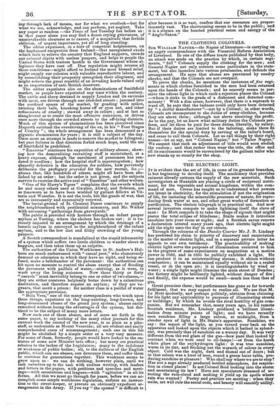THE ELECTRIC LIGHT.
IT is evident that the art of life, in some of its greatest branches, is but beginning to develop itself. The machinery that provides raiment already outruns the supply of the raw materials. Such investigators as Huxtable are placing a circle of reciprocal nutri- ment, for the vegetable and animal kingdoms, within the com- mand of man. Crosse has taught us to understand what powers are latent in electricity, for the stimulation if not the origination of life, for imitating the mineralific processes of nature, for repro- ducing fresh water at sea, and other great works of formation or purification. The electric telegraph is in practical use. And now several inventors compete to make lightning itself the slave of man: Le Mott compels it to take the shape of signals that might pierce the total eclipse of blindness ; Staite makes it introduce sunshine into your room at night; and a Scottish savan renews a declaration uttered many years ago, that electric light might add the night unto the day in our streets. IT is evident that the art of life, in some of its greatest branches, is but beginning to develop itself. The machinery that provides raiment already outruns the supply of the raw materials. Such investigators as Huxtable are placing a circle of reciprocal nutri- ment, for the vegetable and animal kingdoms, within the com- mand of man. Crosse has taught us to understand what powers are latent in electricity, for the stimulation if not the origination of life, for imitating the mineralific processes of nature, for repro- ducing fresh water at sea, and other great works of formation or purification. The electric telegraph is in practical use. And now several inventors compete to make lightning itself the slave of man: Le Mott compels it to take the shape of signals that might pierce the total eclipse of blindness ; Staite makes it introduce sunshine into your room at night; and a Scottish savan renews a declaration uttered many years ago, that electric light might add the night unto the day in our streets.
Through the columns of the Dundee Courier Mr. J. B. Lindsay has preferred his claim to priority of discovery and enunciation in the matter of electric light, and in a separate private letter he appeals to our own testimony. The practicability of making electric light serve the purposes of illumination occurred to him in the progress of some experiments on magnetism as a motive power in 1832, and in 1835 he publicly exhibited a light. He can produce it in an unintermitting stream ; it shines without combustion ; it can be maintained equally without air in a sealed vessel, or in the open air; it is inextinguishable by wind or water ; a single light might illumine the main street of Dundee ; the factory might be brilliantly lighted, without danger of fire ; and finally, the expense would be small—much less than that of gas.
Great promises these ; but performance has gone so far towards fulfilment, that we may expect to realize all. We see that M. Le Mott modestly, and perhaps politicly, abstains from claiming for his light any applicability to purposes of illuminating streets or buildings ; by which he avoids the rival hostility of gas com- panies. But we remember that, many years ago, in his remote Scottish residence, Mr. Lindsay produced a brilliant illumi- nation from minute points of light; and we have recently seen sunshine filling a large saloon, at midnight, from a slender apex of light in Mr. Staite's apparatus. Sunshine, we say : the aspect of the light, as you turned your back on the apparatus and looked upon the objects which it bathed in splend- our, was precisely that of sunshine on a watery day. It was very different from the red glare of the gas—how pure that looked by contrast when we were used to oil-lamps !—or from the harsh white glare of the oxyhydrogen light : it was true sunshine, warm in its tint, and fetching out the warmth of colour in every object. Cold was the night, dark and dismal out of doors; but in that saloon was a knot of men, round a green baize table, pro- ducing sunshine at pleasure ! Who shall say where we are to stop Has not a sage already produced bottled atmosphere, for respira- tion in closed places? Is not Colonel Reid looking into the storm and ascertaining its law ? Have not speculators dreamed of ar- resting the rain-cloud and making it yield up its spoils where rain was wanted ? Poetry and practice are meeting : when they unite, art will rule the social code, and beauty will sanctify utility.


























 Previous page
Previous page